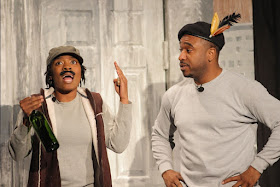 |
| Center: Adriane Galea, surrounded by playwrights Michelle Jane Wilson, Matthew Buckley Smith, Lewis J. Morrow and Jeff Stolzer |
Seeing five shows over two days can be a bit much - even when those plays are presented as staged readings. But I couldn't resist when Adriane Galea afforded me the opportunity to serve as a judge at Outvisible Theatre Company's first-ever New Works Festival this past weekend in Allen Park.
As long-time readers may recall, I consider it a great honor to both call attention to and discuss the work of talented up-and-coming playwrights, as well as offer my thoughts on new plays staged by our theaters. And I've been blessed to share whatever insights I've had on dozens of new plays written by an ever-growing cadre of local playwrights whose work has graced our stages.
But Outvisible's festival was somewhat surprising, as out of the 320 or so scripts submitted, all five chosen were from playwrights outside Michigan. And even more surprising, four out of the five playwrights were in attendance.
The response was not what Adriane, Outvisible's founder and executive director, was expecting. But it turned out to be quite an event, as the subjects of the play were as different from one another as they could possible be. And the playwrights, as equally different as the works, were all enthusiastic participants in the lively discussions that followed each performance, each willing to consider the feedback they received.
Although some last-minute cast changes resulted in a handful of uneven performances, each of the five plays was well received by the audience. Two are ready to be fully produced, in my humble opinion, while two require only minor adjustments. And as Adriane told me during the festival, the plays she liked best after initially reading them were replaced by others once they got on stage.
That, in a nutshell, is the value of such a festival. Although the scripts aren't fully produced but staged with only one or two rehearsals, the concept allows both playwrights and producers to see what works and what doesn't, what makes sense and what doesn't, and what needs fixing and what doesn't. In other words, staged readings serve two basic purposes: to give playwrights an opportunity to receive a professional reading of their work, and to provide producers a chance to assess how successful a script may be if added to their schedule.
For Adriane and Outvisible, this was a festival blessed with literary riches - which made it quite difficult to choose a winner (which would ultimately be given a full production at some point in the next season).
So what was the ultimate factor that determined which play would be chosen? It simply came down to one thing: Outvisible's performance space.
Now in its inaugural season, Outvisible performs in an intimate, black-box space the size of a living room found in a typical 1950s ranch. As such, plays that require elaborate sets and scene changes are difficult to manage, and even a half-dozen actors on stage at the same time would be far too much of a crowd to adequately move around in a meaningful way.
And so with that in mind, Adriane's decision came down to this: Which of a handful of excellent possibilities would work best in her space.
And the winner was Unsportsmanlike Conduct by New York-based Jeff Stolzer, a decision I fully supported.
But what of the others? Personally, I can think of a handful of theaters where The One Difference by Lewis J. Morrow would be a perfect fit. (It's also immediately ready to be produced.) Likewise, once a few script changes have been made, Matthew Buckley Smith's The Major, The Minor, The Living, The Dead and Michelle Jane Wilson's That's Him would work quite well at several local theaters. The trick, now, is to introduce these playwrights to the appropriate artistic directors to see if they can make theatrical magic together.
I hope that happens. Soon.
To find out more about Outvisible Theatre Company, click here.
PS: In a conversation after the festival, it was fun to discover that Minnesota-based playwright Michelle Jane Wilson is actress Inga Wilson's aunt. It IS a small world after all!










